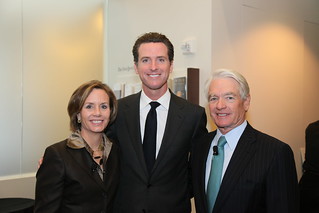 $10 million disappears in right-wing money laundering operation
$10 million disappears in right-wing money laundering operation
by Brian Leubitz
How go those Gap jeans you are wearing today? And your Charles Schwab account is growing, I’m sure. And, of course, you totally bought Eli Broad’s support of Gov. Brown’s tax measure, right?
Well, welcome to the world of dark money, a bizarro land where people get to say and do very different things. Reports released by state investigators show a complex money laundering scheme involving several shady right-wing money movers and organizations, all to help hide the donors of about $25 million intended to fight against Gov. Brown’s tax measure, Prop 30, and for the anti-labor measure, Prop 32. While many of the names will be unfamiliar, some of them are pretty much household names. But these are people that don’t really want the attention, they just want to get their way. Because they are rich and that is what happens.
So, a pair of Republican consultants, Tony Russo and Jeff Miller, went about laundering the money through a vast network of Koch brother connected organizations in order to hide the true source of the money. Just to be clear, there is a word for that here in California: illegal.
The Fisher family, of the clothing firm Gap Inc., contributed more than $9 million. San Francisco investor Charles Schwab gave $6.4 million, and Los Angeles philanthropist Eli Broad sent $1 million.
The money went to a Virginia nonprofit that would use it to pay for the ad blitz and be allowed to keep the contributors secret. Nonprofits, unlike political action committees, are not required to identify their donors under federal law. … But things went from bad to worse. Although Russo handed over $25 million, only about $15 million ended up back in California. And when the money surfaced, it sparked an investigation by state authorities, who last month levied $16 million in penalties against the Arizona group and three others.(LA Times
Somewhere along the line, Sean Noble, a Koch-affiliated operative, decided that he actually wasn’t into sending the last $10 million back to California through their little washing machine. The attention had gotten to be too much. The fact that Russo claims he still doesn’t know what happens to that cash is something of a funny post script.
But the real fight is over the large penalty handed down to the Small Business Action Committee(SBAC), the California PAC that spent the money attacking Prop 30 and supporting Prop 32. The FPPC levied a “disgorgement” penalty that requires the group to pay to the state an amount of money equal to the dark money that they accepted. Of course, the SBAC is fighting the fine, and the result of that fight could mean a lot for how ballot measures are run over the next few years.
Perhaps if voters had easy access to more information, they could simply vote against any initiative campaign that was using the shady money. But in the real world, cash is still king. If the fine is upheld, dark money could stall at the state border. If it is overturned, expect the secretive cash to become an even bigger (yet still overwhelmingly shady) tool in initiative campaigns.
Photo credit: Mayor Gavin Newsom on Flickr. Mayor Newsom (a prominent supporter of Prop 30) appeared with Charles Schwab at the opening of the Charles Schwab flagship space in San Francisco.

Agreed that it’s a “funny postscript” that $10M got lost somewhere and that the success in imposing these fines is critical.
The Times story implies that Russo raised the money for the express purpose of supporting/opposing specific initiatives. And that’s the appearance.
In the FPPC’s release on this fine about 2 weeks ago, they implied that donors were giving to non-specific “issue ads” that would not mention any ballot measure, and thus to some degree the solicitation and “original” sources of funds were not reportable.
I’ve been a treasurer in CA before and it is very hard to imagine “legally” soliciting donors to help specific campaigns and then having them shuttle their donations off to out-of-state nonprofits without everyone in the line having guilty knowledge that they were trying to avoid CA disclosure law. My point being, I would have thought there was an even bigger case to be made here about the intent of the CA-based treasurers as well as the donors themselves. I wonder how they got away with some of what they (apparently) did.